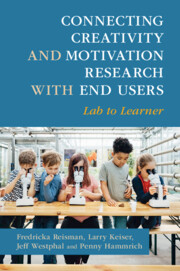Book contents
- Connecting Creativity and Motivation Research with End Users
- Connecting Creativity and Motivation Research with End Users
- Copyright page
- Dedication
- Contents
- Figures and Tables
- Modules
- Boxes
- Preface
- Acknowledgments
- Chapter 1 Translational Education Research
- Chapter 2 Creativity
- Chapter 3 Motivation
- Chapter 4 Assessment Attributes and Related Guidelines
- Chapter 5 Assessment of Creativity
- Chapter 6 Assessment of Motivation
- Chapter 7 Additional Theorists on Creativity and Motivation
- Chapter 8 Neuroscience of Creativity, Mindfulness, and Mind/Brain/Education Science
- Chapter 9 Creativity Modules
- Chapter 10 Motivation Modules
- Chapter 11 Dissemination and Communication Techniques for Translational Research
- Chapter 12 From Individual Compliance to Creative Collaboration: A Business Perspective
- Index
- References
Chapter 4 - Assessment Attributes and Related Guidelines
Published online by Cambridge University Press: 08 February 2024
- Connecting Creativity and Motivation Research with End Users
- Connecting Creativity and Motivation Research with End Users
- Copyright page
- Dedication
- Contents
- Figures and Tables
- Modules
- Boxes
- Preface
- Acknowledgments
- Chapter 1 Translational Education Research
- Chapter 2 Creativity
- Chapter 3 Motivation
- Chapter 4 Assessment Attributes and Related Guidelines
- Chapter 5 Assessment of Creativity
- Chapter 6 Assessment of Motivation
- Chapter 7 Additional Theorists on Creativity and Motivation
- Chapter 8 Neuroscience of Creativity, Mindfulness, and Mind/Brain/Education Science
- Chapter 9 Creativity Modules
- Chapter 10 Motivation Modules
- Chapter 11 Dissemination and Communication Techniques for Translational Research
- Chapter 12 From Individual Compliance to Creative Collaboration: A Business Perspective
- Index
- References
Summary
This chapter includes a description of essential assessment attributes and types of assessments, reviews Bloom’s taxonomy of behavioral objectives, and introduces the developmental math and literacy curricula. In addition, the chapter provides background information for Chapters 5 and 6, which address the assessment of creativity and motivation. Appendix 4A is a glossary.
Keywords
- Type
- Chapter
- Information
- Connecting Creativity and Motivation Research with End UsersLab to Learner, pp. 80 - 108Publisher: Cambridge University PressPrint publication year: 2024



